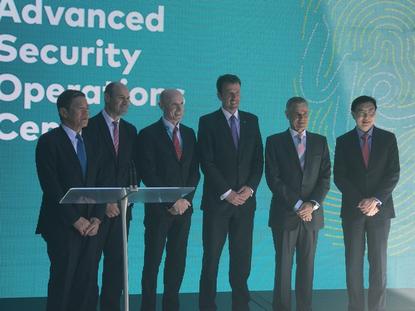$10m Optus SOC a standout as local security players partner, acquire for growth
- 03 November, 2016 16:13

Australia’s information-security industry continues to change rapidly as winners – and losers – stake their claims on a series of partnerships and investments with local implications.
Optus Business led the headlines with the $10 million investment that led to this week’s opening of an Advanced Security Operations Centre (ASOC). The new facility, which is collocated with the company’s Network Management Centre and provides services including threat detection, threat intelligence, incident response and security device management, unites Optus with Macquarie University – addressing a systemic deficiency in business-research collaborations that Optus Business managing director John Patairidis flagged in a recent blog reinforcing the importance of innovation, agility, cyber skills, partnerships, and collaborations.
The new ASOC extends the reach of the services that Optus parent company Singtel added with its $850m acquisition of Trustwave, whose technology powers what Patairidis said was some 5 billion security events every day.
“These events will surge in the coming years as the next generation of intelligent devices come online,” he wrote. “We’re barely managing today’s threats; how are we going to keep our citizens and organisations safe amid this flood of data and capabilities? The short answer is that the cyber security solutions of today will not solve the cyber security issues of tomorrow.”
Recent Optus partnerships with security firms like FireEye, Palo Alto Networks, Check Point Software Technologies and Akamai reflect the company’s determination to round out its security offering. This year has also seen a raft of partnerships including a $10m joint venture with Macquarie University to establish a multi-disciplinary Cyber Security Hub, a partnership with Data61 on its Melbourne-based Cyber Security and Innovation Hub, and an $8m partnership with La Trobe University to work on developing industry-focused cybersecurity curriculum.
Optus is offering tours of the new ASOC in a move that it hopes will clearly position it front-of-mind with Australian businesses seeking partners who are able to offer better-integrated suites of managed security services. Yet Optus isn’t the only company bolstering its local security capabilities: Accenture this week closed its acquisition of Australian security innovator Redcore, a 130-strong consultancy that, local managing director Joshua Kennedy-White told CSO Australia at the time, it acquired in August to fill out its capabilities “across the entire security spectrum” and across the Asia-Pacific market thanks to Redcore’s established network of regional offices.
Those acquisitions – a strategy that some trace back to Deloitte’s 2013 buy of managed security services provider Vigilant – also embraced by Optus rival Telstra, which recently flagged the possibility of further cybersecurity investment – reflect growing business interest in an IT-service market that is expected to pick up pace in 2017.
Recent Gartner predictions suggested that Asia-Pacific IT-services spend – including managed security services off the type Optus and Accenture are building out – grew 2.6 percent over 2015 to be worth $US93.2b ($A120.7b) this year, and would grow a further 6 percent in 2017 to be worth $US98.8b ($A128b). Worldwide information-security spending is expected to grow at 7.9 percent to reach $US81.6b ($A105.7b) this year alone – continuing the healthy spending that has helped the Australian market stand out on the world stage for years.
Yet despite the industry investments in security capabilities, it wasn’t all good news: New Zealand-based analytics vendor Wynyard Group, which has long delivered its analytical tools to law-enforcement authorities and had been pushing hard to pivot the technology into the fast-growing threat-analysis market, was placed into voluntary administration in October and handed to administrators KordaMentha after the board declined to pursue further capital-raising or increased debt to keep the company running.
Wynyard had been a local security-industry success story that attracted the likes of former GCHQ deputy director of cyber defence operations Andrew France OBE and pushed to an ASX listing in early 2015 to complement its initial 2013 listing on the New Zealand Stock Exchange.
Also undergoing organisational change was Dell, which announced this week that it had completed the spinoff of Dell Software Group business units to form separate companies – Quest and SonicWall – that will be pursuing their own strategies in the management and security markets.
Such changes will have immense knock-on effects in the local skills market, where such local investments are seeing security centres of excellence hoovering up skilled IT-security staff as quickly as they can be identified. This will perpetuate demand from companies turning to security-services providers to guarantee access to such skills, as well as providing new career directions for experts that find themselves back on the market due to their involvement in failed ventures.
For companies wanting to leverage the shifting skills market – Telstra is among those pursuing novel ways to feed the growing demand for security-related services – the key to success is embracing flexible sourcing options, says Peter Wilson, CEO of specialty recruiting firm Ignite. “Technology is dramatically altering every aspect of work,” he said in a statement.
“Smart organisations should leverage it where possible to improve talent acquisition and retention. This means choosing recruitment partners that combine the latest technology platforms with a people-focused approach to delivering talent acquisition and retention strategies that set the organisation up for sustainable success.”

